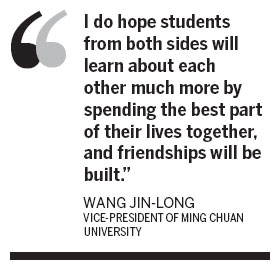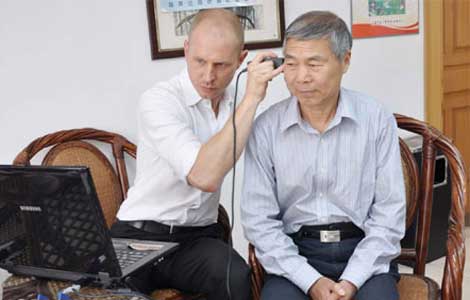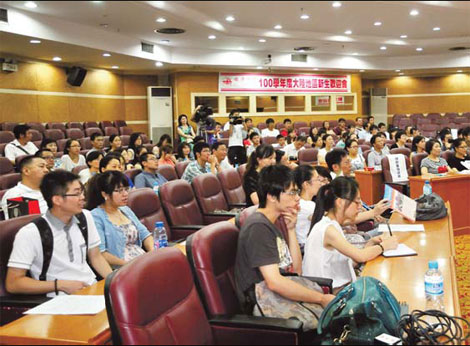Society
Taiwan opens up
Updated: 2011-08-23 08:02
By Zhang Yue (China Daily)
|
A dance competition at Ming Chuan University, one of the universities in Taiwan province opening up to mainland students in September. Photos provided to China Daily |
|
Mainland students at a meeting with university representatives from Taiwan in Xia'men, Fujian province. |
For the first time, high school graduates from the mainland can pursue full-degree study courses on the island. Zhang Yue reports.
When the new semester starts in September, the first batch of 1,015 high school graduates from the Chinese mainland will begin their college lives in Taiwan province.
Legislation was passed in August 2010 allowing students from the mainland to be admitted to universities in Taiwan for full-degree study. In the past, mainland students could only study in Taiwan through exchanges studies.
Now, university recruitment in Taiwan has opened up to six provinces and municipalities in the mainland: Beijing, Shanghai, and Zhejiang, Jiangsu, Fujian and Guangdong provinces.
"This is new for us," says Wang Jin-long, vice-president of Ming Chuan University, in Taipei. "Though a bit hectic, we are excitedly preparing to welcome them."
Ming Chuan University, which enrolled 76 undergraduate students from the mainland this year, has received more than 50 exchange students from the mainland every year over the past decade.
"But this time it is very different," Wang says.
|
Taiwan universities attract mainlanders partly because of the wide-ranging school activities. |
Wang says preparation for recruitment started in March. "Before that, we had no idea that recruitment criteria varied among provinces in the mainland," Wang says.
"In Taiwan, we only have one criterion. For a while, we didn't know how this was going to work."
The mainland students have mixed feelings about their decision.
Zhong Yilun, an 18-year old student from Guangdong province, describes himself as a "laboratory rat", after choosing to study in Taiwan.
He learned that mainland high school graduates can apply for universities in Taiwan on TV, and then discussed the idea with his parents.
"For me, Taiwan is a mysterious place. But I am attracted by Taiwan's free academic atmosphere and the school activities appeal to me. Courses are taught in a more practical way."
Zhong chose to study at Yuan Ze University, majoring in communication.
"Many courses of our major are taught in English, which is challenging for me. But this will help improve my English skills," he says.
He adds that he is looking forward to Taiwan snacks, such as Taiwan-style noodle soup and steamed rice.
Zhang Yezheng from Wuxi, Jiangsu pro-vince, intends to study sociology.
"Taiwan is a beautiful place and I am interested in its local customs. They have also preserved the traditional culture of China very well."
While preparing for the new semester, she also plans to travel around Taiwan during her four-year course.
"My plan is to write a travel log about my experience and show teenagers in the mainland," she says.
But for parents, their children's safety is the top concern.
"My mom is quite worried about the frequent natural disasters there such as typhoons and landslides, and would not agree that I should go at first," Zhong says. "But I kept persuading them as this is a rare opportunity."
Zhong says he made a courageous decision. Only two students applied to study at universities in Taiwan from the high school he graduated from this year.
"Most of my classmates did not know about the new regulation," he says. "Many think I am quite brave to make this choice, but some are worried whether it will be easy to find a job after graduation."
His classmates' concerns do hold some water.
Though mainland students can be admitted to universities in Taiwan, there are still factors that differentiate them from Taiwan students. For example, they are forbidden from working part time while studying, receiving scholarships that will waive the tuition fees, or staying in Taiwan after graduation.
"This are indeed negative aspects for us to recruit students from the mainland," says Hong Chun-qi, principal of Shu-Te University. "In May, when the application process had just started, 150 students applied for our university. Yet only one third of them decided to register by July 6, which was the deadline for admission."
In total, 87 universities in Taiwan received applications from 1,613 students on the mainland. But just 65 percent ended up choosing Taiwan.
"We don't feel we are being treated equally," says Zhang Yezheng. "College is when we learn how to live independently. It costs my parents 40,000 yuan ($6,300) a year for tuition and living expenses without me earning a penny."
 |
Another headache is the administrative work that has to be done. A student surnamed Feng spent more than a month going through the required procedures.
"The procedure is such a big project I feel it is like going to another country. One of my classmates is heading to the United States for undergraduate study. Even her procedures seem simpler than mine," she says.
Students are required to get a Taiwan entry permit, which requires a series of documents such as health certificate, proof of family relations, certificate of deposit and insurance.
Feng's mother, surnamed Guo, says she does not understand why so many certificates are needed.
"I think such unreasonable complications mean that Taiwan is treating students from the mainland very differently," and she is worried her daughter will be discriminated against.
Meanwhile, universities in Taiwan are sparing no efforts to help students from the mainland settle in.
Ming Chuan University representatives went to Xia'men, Fujian province, on Aug 14, for face-to-face meetings with future students and parents.
"What surprised me most is that 50 parents said they will come to Taiwan with the students for their first day," Ming Chuan's Wang says. "This means we need to send 50 invitations to help them get the Taiwan entry permit. We have not handled this in welcoming freshmen before, but we will do our best for their convenience and to help make their stay in Taiwan comfortable."
The university will also start programs to help mainland freshers adapt to their new environment. Overseas Chinese students at the university, and mainland exchange students, will also help out.
"We will do our best to help them have a nice college life, because this is just a start," Wang says. "I do hope students from both sides will learn about each other much more by spending the best part of their lives together, and friendships will be built."
E-paper

Blue economy gets a lift
Coastal areas of Shandong, Zhejiang and Guangdong to spearhead sector development.
The light touch
Long way to go
Outdoor success
Specials

Star journalist remembered
Friends, colleagues attended a memorial service to pay tribute to veteran reporter Li Xing in US.

Hot pots
Tea-making treasures catch the fancy of connoisseurs as record prices brew up interest

Hear we go
Polish Audiologist helps thousands of Chinese hear for the first time.



